Reagan, Heston, and “Kennedy Democrats”
This is part two of a series that examines President John Kennedy’s liberal beliefs and breaks down the misrepresentations of JFK by Larry Elder. Elder presented a very distorted version of JFK in a 2017 online piece, “John F. Kennedy: What Would He Think of His Party?” that both reflects and informs the opinions of many people on the political right who wish to pretend that Kennedy would be a Republican or a conservative, if he were alive today. If you have not read Part 1 of this series, I advise you begin there.
Elder began his article with two often repeated quotes that form the foundation for the rest of his errors:
President Ronald Reagan said: “I didn’t leave the Democratic Party. The party left me.” Actor and former president of the National Rifle Association Charlton Heston, who called himself a “Kennedy Democrat,” switched to the Republican Party after the 1960s.
By beginning here, Elder suggests that the Democratic Party has fundamentally changed, while men like Reagan and Heston stayed the same. Elder wants his reader to make the connection back to the title of his piece to ask themselves, “Would JFK have followed the same path as Reagan and Heston?” And he does what he can to lead his readers to that conclusion.
Both of the quotes Elder cites are accurate, in a vacuum, but we don’t live in a vacuum. As usual, context is vital to any genuine understanding and you should be very leery of people who make no effort to understand or address the context of the facts they present.
Reagan, the Democrat
Ronald Reagan was originally a Democrat. He voted for FDR, all four times that Roosevelt was elected, and then he supported and voted for Truman in 1948. In the next three presidential election years, he voted for Eisenhower twice and then Nixon, while still being registered as a Democrat. He even campaigned as a, “Democrat for Nixon,” 1960. Finally, in 1962, while Kennedy was in the White House, Reagan officially switched his party affiliation in his home state of California. So, when was it that the Democratic Party, “left him?” And how did it do this? By running Adlai Stevenson against Eisenhower and John Kennedy against Nixon?
Now consider this 1948 radio broadcast where Reagan spoke to the nation on behalf of President Truman and the Democratic Party. These were his views at the time:
I remember listening to the radio on election night in 1946. Joseph Martin, the Republican Speaker of the House, said very solemnly, and I quote, “We Republicans intend to work for a real increase in income for everybody by encouraging more production and lower prices without impairing wages or working conditions.” Remember that promise. A real increase in income for everybody. But what actually happened? The profits of corporations have doubled, while workers wages have increased by only one quarter. In other words, profits have gone up four times as much as wages. And the small increase workers did receive was more than eaten up by rising prices, which have also bored into their savings.
…
Prices have climbed to the highest level in history, although the death of the OPA was supposed to bring prices down through quote, “The natural process of free competition,” unquote. Labor has been handcuffed by the vicious Taft-Hartley Law. Social Security benefits have been snatched away from almost a million workers by the Gerhart Bill. Fair employment practices, which have worked so well during wartime, have been abandoned. Veterans pleas for low cost homes have been ignored. And many people are still living in made over chicken coops and garages. Tax reduction bills have been passed to benefit the higher income brackets alone. The average worker saved only $1.73 a week. In the false name of economy millions of children have been deprived of milk once provided through the Federal School Lunch Program. This was the payoff of the Republicans’ promises. And this is why we must have new faces in the Congress of the United States. Democratic faces. This is why we must elect not only President Truman, but also men like Mayor Hubert Humphrey of Minneapolis, the Democratic candidate for Senator from Minnesota.
…
Mayor Humphrey and Ball are the symbols of the political battles going on today. While Ball is a banner carrier for Wall Street, Mayor Humphrey is fighting for all the principles advocated by President Truman. For adequate low cost housing. For civil rights. For prices people can afford to pay. And for a Labor movement freed of the Taft-Hartley Law. I take great pride in presenting my friend, from Minneapolis, Mayor Hubert H. Humphrey, candidate for United States Senator.
Take out the names and just look at the basic arguments here. Workers are making too little while corporate profits and prices are too high. Restrictions have been put on labor unions and government programs have been cut back, harming children, families, and the elderly. The wealthy are getting tax breaks while their profits soar and working people’s wages are kept low. We need to prioritize low cost housing and civil rights over Wall Street. Does this sound like a fundamentally different Democratic Party from the one today? Does this sound like the kind of speech Reagan would have made when he was running for the Presidency as a Republican? Where is the evidence that the Democrats changed, while Reagan remained true to some previous principles that they had abandoned? Just because Reagan said they left him doesn’t make it so.
A Heston Democrat
Similarly, just because Heston called himself a, “Kennedy Democrat,” does not mean that Kennedy would have called himself a, “Heston Democrat,” and we can not logically conclude a hypothetical future for JFK based on Heston’s life.
When Heston joined the, “March on Washington for Jobs and Freedom,” where Dr. King gave his, “I have a dream,” speech, Heston declared, “I could no longer pay only lip service to a cause that was so urgently right.” Many other notable figures joined him, who presumably felt the same way, like Harry Belafonte, James Baldwin, Marlon Brando, Paul Newman, Joan Baez, Bob Dylan, Josephine Baker, Lena Horne, Joseph Mankiewicz, and Sammy Davis Jr. How many of them later became Republicans? Ok, Sammy Davis did endorse Nixon in 1972, but he was a Democrat before and after that.
There was one high-profile African American Republican celebrity at the march, Jackie Robinson, but his story tells a very different one than Heston’s. In 1960, Robinson attended the Democrat Convention and considered endorsing Kennedy, but the respect paid to Southern segregationist Democrats made him sick and he left. In 64 he attended the Republican Convention, supporting New York Governor Nelson Rockefeller for President, but Barry Goldwater was chosen and his pandering to Southern racists won many traditionally Democrat white voters to the GOP. Of the 1,300 delegates at the convention, only 15 were black. One of them had his credentials revoked and another had a cigarette put out on him by a Goldwater supporter. Robinson later said he now had, “a better understanding of how it must have felt to be a Jew in Hitler’s Germany.” And Elder wants us to believe this was the party Heston ran to because the Democrats stopped acting like Kennedy?
There is a funny story that William Wyler, the Director of Ben-Hur (1959) tells in the documentary, The Celluloid Closet (1995). Before shooting the scene where old friends Judah Ben-Hur (Charlton Heston) and Messala (Stephen Boyd) reunite after many years, Wyler told Boyd to play it like the two men had a sexual relationship when they were young. When Boyd asked if Wyler was going to tell Heston to do the same thing, Wyler said, no, because Heston would never go for it. This story speaks to the limits of Heston’s tolerance and acceptance. How he stood apart from other Hollywood figures who were likely also Democrats, at the time. And how his movement away from calling himself a “Kennedy Democrat” to being a Nixon Republican in 1972, likely had more to do with his acceptance of who he was, rather than a fundamental shift in the Democratic Party.
In addition to being an outspoken critic of gay rights, Heston became the President and public face of the National Rifle Association (NRA) in his sunset years, advocating strongly for a personal right to own guns. “I’ll give you my gun when you take it from my cold, dead hands,” is a line as famous as any Heston ever spoke in the movies. It is not a sentiment you would expect from most Democrats, including John Kennedy (there will be more on guns in Part 4).
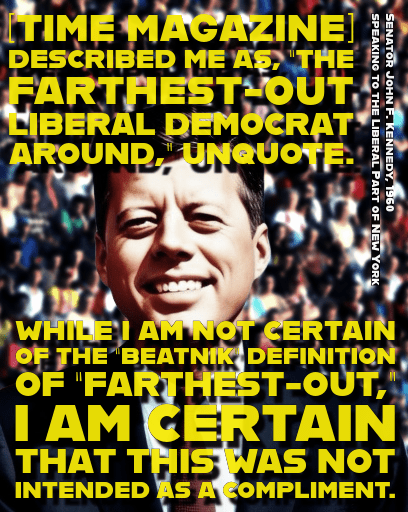
Hypothetical History
Obviously, President Kennedy’s death was a major factor in shaping the events that followed it, which makes any discussion about what he would later do, had he lived, rather contrived. Nevertheless, consider these thought experiment questions:
1) Would Kennedy have supported Reagan for President, as Heston did, despite the fact that Reagan never supported Kennedy and Kennedy’s ideas? What justification can you find for the alleged change that JFK would have undergone?
2) When Reagan nominated Robert Bork to sit on the Supreme Court and Heston supported this decision, John Kennedy’s little brother, Senator Edward “Ted or Teddy” Kennedy declared, “Robert Bork’s America is a land in which women would be forced into back-alley abortions [and] blacks would sit at segregated lunch counters.” Who would JFK have stood with, Reagan and Heston or Teddy? If you think he would have backed Bork, why? Should we also imagine that Hollywood legends like Gregory Peck, who opposed Bork and remained a life-long Democrat, somehow missed what only Heston and Reagan could see? Based on what evidence?
There are countless questions like this that could be asked, because Elder’s arguments are, at best, a half truth, and as they say, “A half truth is a whole lie.” Like a magician, Elder is entertaining his audience rather than informing them, with sleight of hand, if not smoke and mirrors. Unfortunately, people mistake him for a journalist, a historian, or a truth teller of some sort.
Neither Reagan nor Heston were abandoned by the Dems and “Kennedy Democrats” did not morph into Republicans. There were Southern Democrats who became Republicans and greatly changed the character of the Republican Party, as Jackie Robinson’s experience demonstrates, but that does nothing to help Elder’s arguments. In fact, it is further proof of how weak Elder’s arguments are.
In the end, whether you admire the paths taken by Reagan and Heston, or you detest them, what truly matters is understanding that their personal journeys were distinct—both from each other and from President Kennedy’s. Their stories, while compelling, do not serve as reliable indicators of broader political shifts. To truly learn from history, we must resist the urge to simplify complex narratives to fit our preconceived beliefs. Only by considering a wider context can we hope to uncover the truth, rather than imposing our own conclusions upon it.

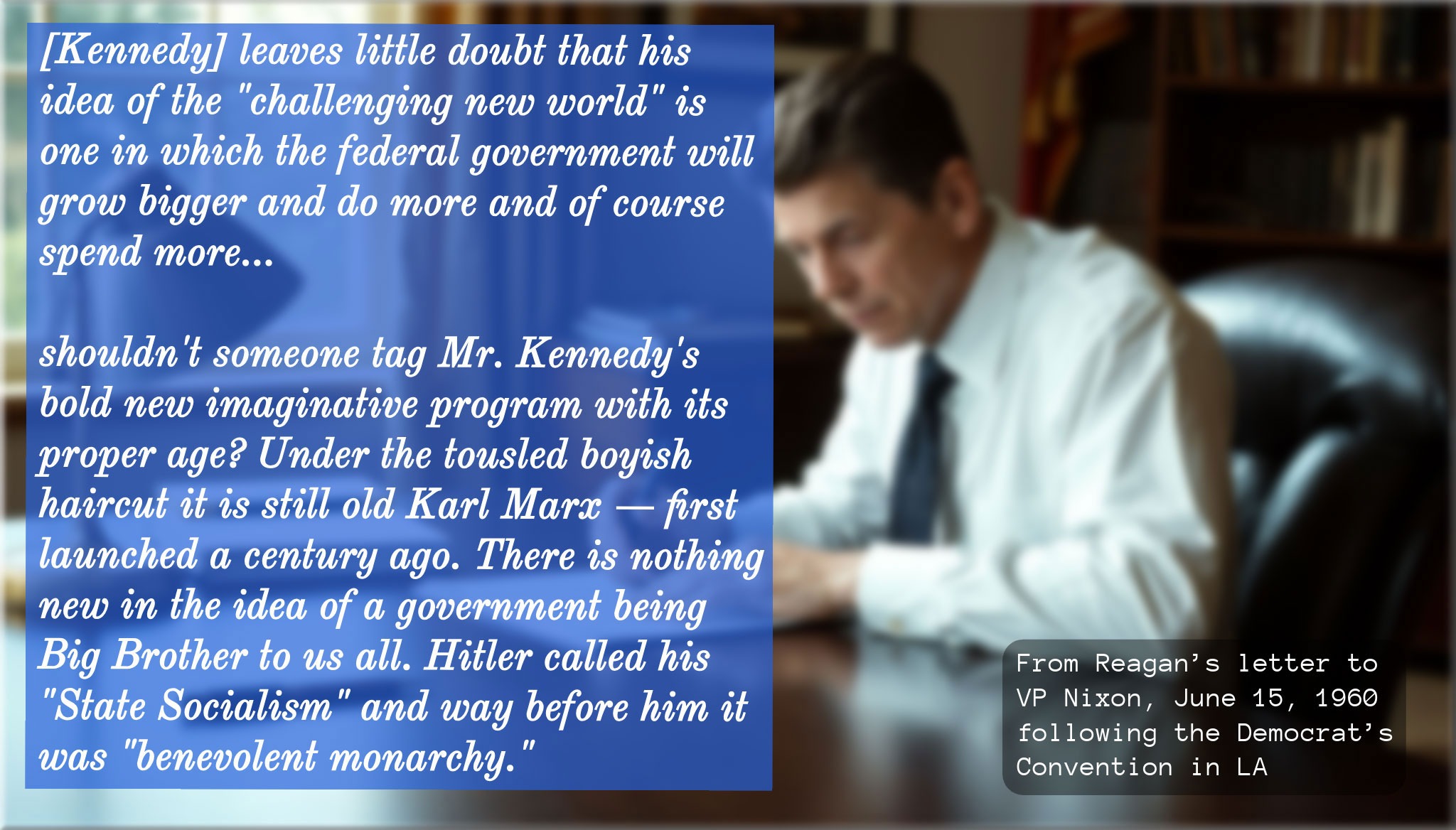



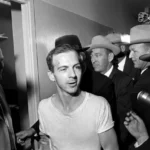
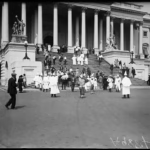
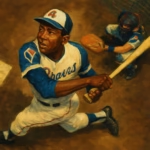

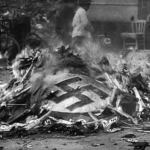
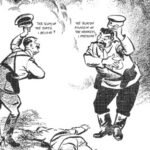


Leave a Reply